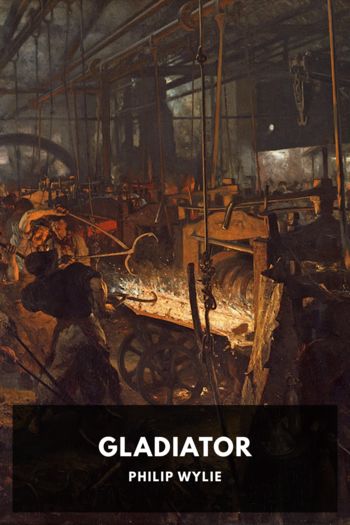Gladiator - Philip Wylie (readnow .TXT) 📗

- Author: Philip Wylie
Book online «Gladiator - Philip Wylie (readnow .TXT) 📗». Author Philip Wylie
“Just drive out of town,” Hugo said.
McClaren came to. They bumped along for miles and he did not dare to speak. The apartment buildings thinned. Street lights disappeared. They traversed a stretch of woodland and then rumbled through a small town.
“Who are you?” McClaren said.
“I’m just a man, McClaren—a man who is going to teach you a lesson.”
The taxi was on a smooth turnpike. It made swift time. Twice Hugo satisfied the driver that the direction was all right. At last, on a deserted stretch, Hugo called to the driver to stop. McClaren thought that he was going to die. He did not plead. Hugo still held him by the arm and helped him from the cab.
“Got any money on you?” Hugo asked.
“About twenty dollars.”
“Give me five.”
With trembling fingers McClaren produced the bill. He put the remainder of his money back in his pocket automatically. The taxi-driver was watching, but Hugo ignored him.
“McClaren,” he said soberly, “here’s your lesson. I just happen to be the strongest man in the world. Never tell anybody that. And don’t tell anyone where I took you tonight—wherever it is. I shan’t be here anyway. If you tell either of those two things, I’ll eat you. Actually. There was a poor devil smothering in that safe and I yanked it open and dragged him out. As a reward you and your dirty scavengers were put to work on me. If I weren’t as merciful as God Himself, you’d all be dead. Now, that’s your lesson. Keep your mouth shut. Here is the final parable.”
Still holding the policeman’s arm, he walked to the taxi and, to the astonishment of the driver, gripped the axle in one hand, lifted up the front end like a derrick, and turned the entire car around. He put McClaren in the back seat.
“Don’t forget, McClaren.” To the driver: “Back to where you picked us up. The bird in the back seat will be glad to pay.”
The red lamp of the cab vanished. Hugo turned in the other direction and began to run in great leaps. He slowed when he came to a town. A light was burning in an all-night restaurant. Hugo produced the five-dollar bill.
“Give me a bucket of water—and put on about five steaks. Five.”
XIXIt was bright morning when Hugo awoke. Through the windowpane in the room where he had slept, he could see a straggling back yard; damp clothes moved in the breeze, and beyond was a depression green with young shoots. He descended to the restaurant and ate his breakfast. Automobiles were swishing along the road outside and he could hear a clatter of dishes in the kitchen. Afterwards he went out doors and walked through the busy center of the village and on into the country.
Sun streamed upon him; the sky was blue; birds twittered in the budding bushes. He had almost forgotten the beauty and peacefulness of springtime; now it came over him with a rush—pastel colors and fecund warmth, smells of earth and rain, melodious, haphazard wind. He knew intuitively that McClaren would never send for him; he wondered what Mr. Mills would say to Mr. Shayne about him. Both thoughts passed like white clouds over his mind and he forgot them for an indolent vegetative tranquillity.
The road curved over hills and descended into tinted valleys. Farmers were ploughing and planting. The men at the restaurant had told him that he was in Connecticut. That did not matter, for any other place would have been the same on this May morning. A truck-driver offered him a ride, which Hugo refused, and then, watching the cubic van surge away in the distance, he wished fugitively that he had accepted.
Two half dollars and a quarter jingled in his pocket. His suit was seedy and his beard unshaven. A picture of New York ran through his mind: he stood far off from it gazing at the splendor of its towers in the morning light; he came closer and the noise of it smote his ears; suddenly he plunged into the city, his perspective vanished, and there rose about him the ugly, unrelated, inchoate masses of tawdriness that had been glorious from a distance, while people—dour, malicious, selfish people who scuttled like ants—supplanted the vista of stone and steel. The trite truth of the ratio between approach and enchantment amused him. It was so obvious, yet so few mortals had the fine sense to withdraw themselves. He was very happy walking tirelessly along that road.
After his luncheon he allowed a truck to carry him farther from the city, deeper into the magic of spring. The driver bubbled with it—he wore a purple tulip in his greasy cap and he slowed down on the hilltops with an unassuming reverence and a naive slang that fitted well with Hugo’s mood. When he reached his destination, Hugo walked on with reluctance. Shadows of the higher places moved into the lowlands. He crossed a brook and leaned over its middle on the bridge rail, fascinated by an underwater landscape, complete, full of color, less than a foot high. From every side came the strident music of frogs. Spring, spring, spring, they sang, rolling their liquid gutturals and stopping abruptly when he came too near.
In the evening, far from the city, he turned





Comments (0)